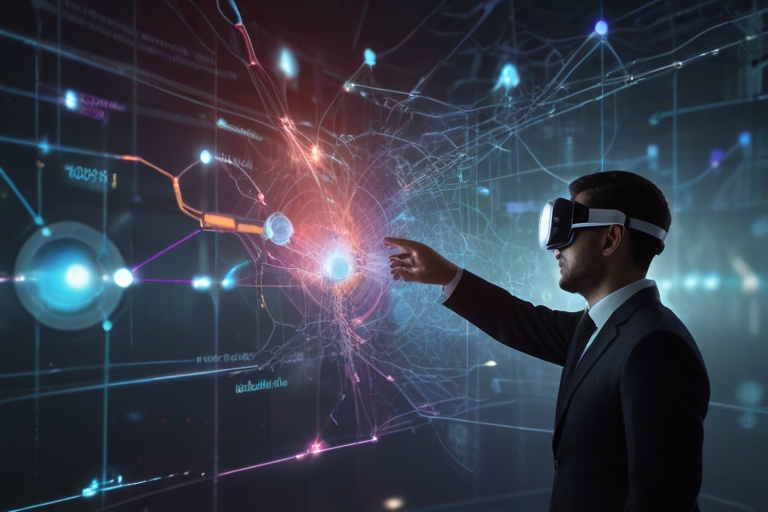Project related to the Master in Interaction Design and Immersive Experiences, Barcelona
My Prompt
Generate a project description for a service for working with a three-dimensional mind map. It is used for planning, structuring existing information, and studying new concepts. Unlike two-dimensional flat mind maps, it allows for deeper immersion into the subject being studied and engages new areas of the brain responsible for three-dimensional perception.
For viewing and work, augmented reality (AR) or virtual reality (VR) headsets or glasses are used. In the future, the use of neurointerfaces will allow interaction with the three-dimensional mind map through the power of thought, which can assist people with limited abilities.
The use of generative neural networks and the exponential growth of the VR industry will enable the on-the-fly creation of three-dimensional maps on given topics and navigate through them, opening new horizons in the education of the future.
Ai Tools: ChatGPT4, Leonardo Ai
MindScape: Three-Dimensional Mind Mapping for Enhanced Learning
Overview:
MindScape is an innovative service revolutionizing traditional mind mapping by introducing a three-dimensional approach to planning, structuring information, and exploring new concepts. Unlike conventional two-dimensional mind maps, MindScape immerses users in a dynamic, spatial environment, engaging the brain’s three-dimensional perception capabilities for deeper understanding and enhanced cognition.
Key Features:
1. Augmented Reality (AR) and Virtual Reality (VR) Integration: Users can explore and interact with their three-dimensional mind maps using AR or VR headsets, providing an immersive experience that facilitates spatial learning and comprehension.
2. Neurointerface Compatibility: Future iterations of MindScape will integrate neurointerface technology, enabling users to interact with their mind maps through the power of thought. This feature holds promise for assisting individuals with limited abilities, opening new avenues for accessibility and inclusivity.
3. Generative Neural Networks: MindScape utilizes advanced generative neural networks to dynamically generate three-dimensional mind maps on various topics. This capability allows for on-the-fly creation of personalized mind maps tailored to users’ needs and interests, fostering continuous learning and exploration.
4. Educational Applications: MindScape holds immense potential in education, offering a novel approach to learning and knowledge retention. By visualizing complex concepts in three dimensions, students can gain deeper insights and form stronger mental connections, enhancing their academic performance and critical thinking skills.

Benefits:
1. Enhanced Learning Experience: The immersive nature of MindScape facilitates deeper understanding and retention of information, making learning more engaging and effective.
2. Improved Cognitive Abilities: By stimulating areas of the brain responsible for three-dimensional perception, MindScape enhances cognitive functions such as spatial reasoning and problem-solving.
3. Accessibility and Inclusivity: The integration of neurointerface technology ensures that individuals with diverse abilities can benefit from MindScape, promoting accessibility and inclusivity in education and beyond.
Future Prospects:
As the VR industry continues to experience exponential growth and advancements in generative neural networks accelerate, MindScape is poised to redefine the future of education. By harnessing cutting-edge technologies and innovative approaches to learning, MindScape aims to empower individuals worldwide to explore, understand, and create knowledge in three dimensions.



